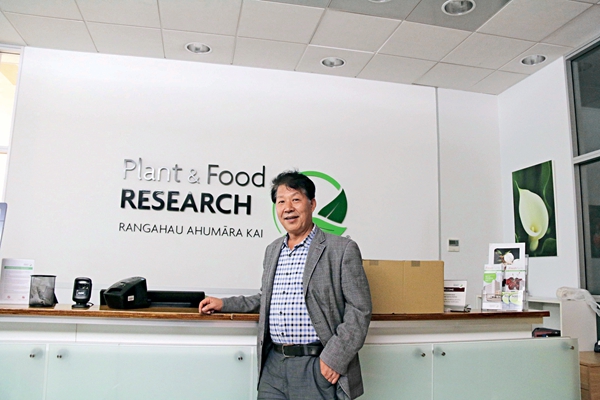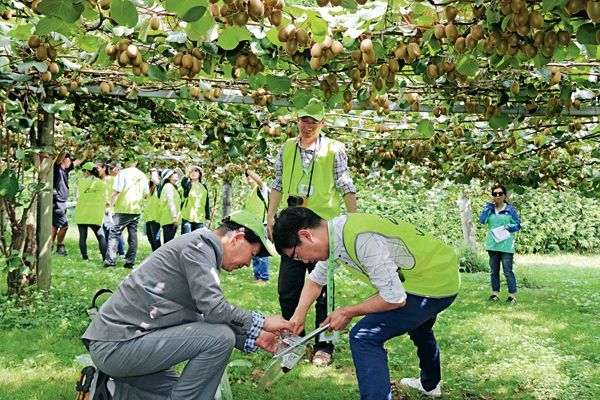Sustainable Table, Innovative Agriculture
China Today, June 13, 2017 Adjust font size:
Chinese agriculture relied on organic fertilizer for 4,000 years, but since farmers switched to chemical variants a few decades ago, various problems, such as soil degradation, lower crop disease resistance, deterioration in the quality of agricultural products, and agricultural nonpoint source pollution, have arisen. What has caused this non-sustainable efficacy of chemical fertilizers? Professor Liu Cunshou of Northwest Agriculture and Forestry University shared his views on this phenomenon with China Today.

Professor Liu visits a New Zealand-based plant and food research center
Professor Liu is an experienced agricultural scholar and practitioner. After analyzing the side effects of chemical fertilizers and carrying out groundbreaking scientific innovations, he formulated a new type of fertilizer that makes effective use of natural organic matter.Seeking Answers from Virgin Forest
Liu doesn’t totally agree with the view that the harmful effects of chemical fertilizers are due to farmers’ excessive use of them.
After carrying out research on developed countries’ early use of chemical fertilizer and its later application in developing countries, Liu discovered that all concerned had encountered similar problems. He pinpointed the rule governing the process that chemical fertilizers accelerated the consumption of soil carbon, so reducing the organic matter content in soil. His research concluded that organic fertilizers could counterbalance the side effects of chemical fertilizers.
This explains why certain developed countries have recommended reverting to the use of organic fertilizers, in recent years.
“To resolve this problem, we need to discern the reason why chemical fertilizers have this side effect by distinguishing the differences between soil in its natural state and that which has been treated with chemical fertilizers,” Liu said.
Liu launched his research using soil samples from virgin forests as soil there is in its natural state. He and his team studied the soluble humic acid in the soil and identified its composition and existing form. After research and experimentation, they found that natural soil is rich in various small organic molecular substances and assorted mineral elements which exist as coordination complex.

Professor Liu and his colleague collect soil samples from a kiwi orchard during their trip to New Zealand
They reached three conclusions: first, plants absorb organic nutrition through their roots. Second, the healthy growth of plants requires multiple mineral elements. Third, a coordination compound can enhance the bioavailability of plants.
These findings theoretically explained the occurrence of chemical fertilizer side effects. As all chemical fertilizers are inorganic, the only minerals they provide are nitrogen, phosphorus, and potassium. Neither this range of minerals nor their existing form is sufficient to grow healthy plants. The long-term application of chemical fertilizers results in a shortfall of organic nutrition and various types of mineral nutrition. As this imbalance continues, the side effects gradually worsen.
Fertilizer Industry Revolution
The research Liu’s team carried out revealed the decisive impact that soluble humic acid has on soil fertility and the supply of nutrition to plants.
“The principle is that where increasing the content of soluble humic acid in soil boosts soil fertility,” Liu said. Humid acids are produced through biodegradation of natural organic matter, and are found in organic fertilizers. But that does not necessarily mean that applying organic fertilizers substantially boosts soil fertility and reduces the side effects of chemical fertilizers. On the one hand, the efficacy of different organic fertilizers varies greatly; on the other, organic fertilizers can only be absorbed and utilized by plants after soil microorganisms have biodegraded them into small soluble molecular substances. But the slow biodegradation process and low utilization rate in soil of organic carbon significantly affects the efficacy of organic fertilizers.
To heighten the efficacy of organic fertilizers and increase the utilization rate of organic carbon, Liu and his team embarked on research using a chemical enzymatic method to biodegrade natural organic matter. After five years of research and experimentation they made breakthroughs in developing a technology whereby natural organic matter can be completely biodegraded in just four hours, 180-times faster than by micro-organisms. More important is that the utilization rate of organic carbon exceeds 95 percent – 47.5-times more effective than the capability of microorganisms.
Based on the new technology, Liu continued to lead his team in developing a new type carbon-based nutrition compound fertilizer.
After more than a decade of experimentation using various types of soils and crops, they found that the new carbon nutrition compound fertilizer combines the advantages of organic fertilizers and chemical fertilizers, and avoids the shortfalls of both. It thus achieves a balance between high yield and good quality, as well as between nutrition supply and enhanced plant disease resistance. After being applied in an apple orchard in Qianxian County in Shaanxi Province for nine consecutive years, the amount of fertilizer used was reduced by 26 percent, and the yield of apples increased by 42 percent. The use of nitrogen, phosphorus, and potassium was reduced by nearly 60 percent, Alternaria leaf and fruit spot in apples was fundamentally eradicated, and the quality of the apples met the required standards for organic foods.
On July 10, 2016, Shaanxi Provincial Department of Science and Technology organized a team of domestic agricultural experts to evaluate the results of Liu’s study and research. They all agreed that Liu and his team had made both theoretical and technological innovations, so creating huge ecological and social benefits. They regarded this technology as globally advanced.
“This is expected to trigger a revolution in the fertilizer industry,” said Professor Zhao Yufen, an organic chemistry expert and member of Chinese Academy of Sciences.
A “China Formula”for Eco-Farming
“China has a large population but scarce arable land. Pursuing a high yield and multiple cropping index – the degree of utilization of a piece of farmland, calculated according to the sum of areas planted with different crops which are harvested throughout the year, divided by the total cultivated area – is the only way to feed the people. Restoring soil fertility by the system of grain crop, forage crop, and even fallow field rotation is difficult in China,” Liu said frankly when commenting on the current state of Chinese agriculture.
In response to China Today’s question about how the conflict between ecological security and agricultural development may be resolved, Liu said that the two factors are not necessarily contradictory. The current conflict could be seen as punishment for disregarding the laws of nature. “On the one hand, to produce chemical fertilizers, people need to consume non-renewable natural resources. And applying chemical fertilizers results in environmental pollution, deteriorated soil quality, and lower resistance to plant disease. Using chemical pesticides guarantees the yield, but risks food safety and environmental pollution. On the other hand the billions of tons of waste we generate in the process of agricultural production and processing, and raising farm animals are major contributors to nonpoint source pollution. However, for me this is not waste, and is only defined as such because we haven’t yet developed a technique to utilize it,” Liu said. “The natural organic waste generated every year in China contains about 60 million tons of nitrogen, phosphorus, and potassium, four million tons of other mineral elements, and 500 million tons of organic carbon. The amount of nitrogen, phosphorus, and potassium generated by organic wastes is equivalent to the total content of nitrogen, phosphorus and potassium in chemical fertilizers totally used in 2015. Therefore, theoretically, if we can make full use of the resources generated by organic waste, we don’t need to use chemical fertilizers to achieve high yield, and the soil condition will improve. If we think of forests as the lungs of the earth, then the soil is like its liver. The condition of the soil decides the quality of both water and air. Healthy soil guarantees healthy plants and hence healthy people,” Liu added.
The new organic fertilizer Liu’s team has developed showcases their resolve to explore a new technology that will improve the traditional approach to farming. It accords with the laws of nature and China’s practical conditions, and can meet the needs of modern production. Liu and his team have in effect contributed their wisdom towards a “China formula” for eco-farming.